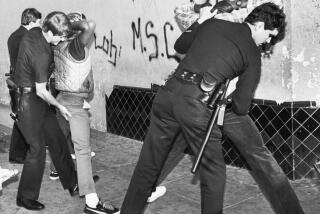One Certainty if Ng Is Tried Here--It’ll Cost : Courts: Judge says bankruptcy isn’t a factor as he mulls request to have state’s most expensive murder case moved.
It could be years before the torture-murder case against Charles Ng is set for trial, but the preliminary paperwork already has filled an 1,100-square-feet area in a two-story condo that his defense attorneys have been using as a temporary office in Calaveras County.
The witness list has 600 names. Already, it has cost about $6 million and threatens to cost millions more.
And it’s all coming to Orange County, unless the local Board of Supervisors succeeds in its effort to have the trial moved away.
“I cannot believe we are discussing funds for a case that is going to cost more than . . . the Simpson case when we are laying off our staff and not responding to child abuse reports,” said Orange County Supervisor William G. Steiner. “I feel that justice can be served, but in another community that has the resources.”
Although most of the costs for the trial--expected to be the costliest and longest murder trial in California history--will be paid by the state and Calaveras County, the Orange County public defender’s office had asked the supervisors for $100,000 in start-up funds to cover expenses associated with the case.
The supervisors responded last week by voting to ask Presiding Superior Court Judge James L. Smith to have the trial of Ng, 33, a former Marine accused of the torture-murders of at least 12 people in Northern California, moved to another county.
Smith has said that although there is a possibility of a change of venue, the county’s financial crisis will not be a factor in the decision.
“I agree with the Board of Supervisors that it would be less burdensome on the county if the case is transferred somewhere else, but that’s not the question,” Smith said. “The question is whether a change of venue is legally possible.”
Ultimately, Smith said, the decision lies with Superior Court Judge Robert R. Fitzgerald, to whom the case was assigned when it was ruled that pretrial publicity had jeopardized Ng’s right to a fair trial in Calaveras County, where the killings occurred. Fitzgerald tentatively rejected a motion to move the trial only two weeks ago.
The Judicial Council of California had recommended that Ng’s trial be transferred to Sacramento or Orange County, but decided on the latter because the case had commanded greater attention in the Sacramento media.
The slayings were allegedly committed by Ng and Leonard Lake in a cabin a few miles from Wilseyville, a piney Sierra foothills town about 150 miles east of San Francisco. Homicide investigators unearthed 45 pounds of charred bone fragments and teeth near the cabin.
Police said that they believe Lake and Ng used a variety of stories to lure their victims, one of whom was Robin Scott Stapley, a 25-year-old Orange County resident. Most of the victims were from Northern California.
Lake committed suicide with a cyanide capsule shortly after his June, 1985, arrest on a shoplifting charge at a San Francisco-area store. Ng, who was with Lake at the time of the arrest, escaped and fled to Canada, only to be caught and returned four years ago after a protracted fight against extradition.
About 90% of the trial’s costs will be picked up by Calaveras County and a state fund which will cover attorneys’ fees, courtroom expenses and witness travel. However, the Orange County public defender’s office is concerned with the remaining 10% in overhead that the state will not reimburse. Those costs include the lease of a building to house the paperwork, lawyers’ administrative costs and incidental expenses.
Last week’s request from the public defender’s office for $100,000 was destined to pay only start-up costs. Over the course of the four years the trial is expected to last, the county could pay hundreds of thousands of dollars in overhead, Chief Deputy Public Defender Carl Holmes said.
“This is a real bad deal for the taxpayers of the state because the location of the case in Orange County turns out to be the most expensive way to handle and try the case,” Holmes said.
Smith said that some of the factors Fitzgerald will consider in his decision are whether pretrial publicity may have made it impossible for Ng to get a fair trial in Orange County too, and whether Orange County is convenient for witnesses.
“But obviously, the financial crisis which the county is embroiled in right now is not a factor in whether the defendant gets a fair trial in the case,” Smith said.
The Orange County public defender’s office wants the trial moved to San Francisco.
“Most of the victims are from Northern California, so the logical place for the trial would be in Northern California at the San Francisco public defender’s office,” Holmes said. “There seems to be discussion about what the county can recover in costs. Some think that it can recover these costs; I strongly feel that it cannot.”
But the fact is, Smith said, no county would welcome this hot potato: “Would it be easier for us if the trial went someone else? Sure, that’s a slam-dunk. But if that’s the case, then nobody would want the case. I don’t know of a court in the state that would actively solicit to take this case. It’s going to take a lot of resources.”
More to Read
Sign up for Essential California
The most important California stories and recommendations in your inbox every morning.
You may occasionally receive promotional content from the Los Angeles Times.









